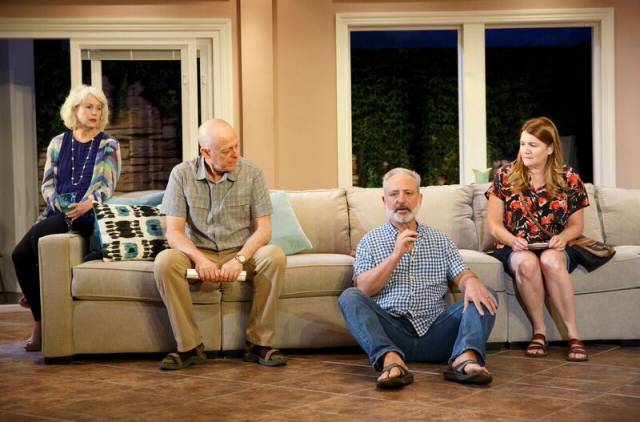

There’s something missing in the salmon-colored living room of Pete (Mark Blum) and Mary (Mare Winningham), somewhere in the American sunbelt. And it’s not just the old sneakers that Pete may or may not have accidentally stuffed beneath the big sectional sofa. Unable to find his footwear, 60-something man-child Pete turns to grilling his somewhat younger wife about whether or not she is happy. He’s noticed lately the troublesome moments when she gazes sadly into space. Mary insists she’s happy—most of the time, anyway—but the more we watch her, the more downbeat and distracted she becomes.
The play—Dan LeFranc’s longwinded but often engaging Rancho Viejo, at Playwrights Horizons—is comic in a loopy, neo-absurdist way. I was reminded at moments of early Edward Albee and at other times of the darkly satirical Christopher Durang. Beneath his goofy spoofing of a group of lazy-minded suburbanites, LeFranc has tucked some big layers of melancholy and some unsettling hints of menace.
We eventually meet three other couples in Pete and Mary’s circle. There are overgrown bro Gary (Mark Zeisler) and his detached and catty wife Patti (Julia Duffy). Then there’s techie Leon (Tyrone Mitchell Henderson), along with his sour-mouthed partner (or is she merely his girlfriend?) Susanne (Lusia Strus). Completing the collection are the odd but amiable Mike (Bill Buell) and his Guatemalan-born mate Anita (Ruth Aguilar), who met each other online. Anita launches long tirades in Spanish that only Mike can come close to deciphering—though the others listen with polite blandness.
In addition, there’s the odd man out—a mysterious (and fairly creepy) teenager named Tate, aka “Taters” (Ethan Dubin), who, for some unexplained reason, hangs out in and around the couples’ homes. (In keeping with Malvina Reynolds’s old conformity-conscious song “Little Boxes,” the same living-room set—by Dane Laffrey—represents the abodes of multiple couples, although “little” wouldn’t be an apt descriptor for what seem to be mini-McMansions.)
Complications ensue when pontificating worrywart Pete becomes obsessed with the marital difficulties of Gary and Patti‘s son Richie, who lives in another part of the country. LeFranc develops this conflict for over three hours, counting two intermissions. It’s a long haul.
Still, there’s something intriguing in LeFranc’s unsophisticated and sometimes outright dopey characters. Their brains may be stagnant ponds but their souls thrash like quietly agitated whirlpools as they confront aging, loneliness, mortality, a sense of insignificance, and that bugaboo of the unexamined life: art. Art is so weird, most of the characters—with the exception of Mary, Gary (who’s an aspiring writer), and Tate—concur. Never mind that they’re all blind to their own considerable eccentricities. There’s an apparent in-joke late in the play about why art takes so darn long. It provoked muffled chortles from audience members who were clearly ready to head for home and get on with their own lives.
It helps immensely, though, that the cast (under the direction of Daniel Aukin) is so talented and watchable. Duffy and Sus are especially funny. And Winningham gives the production an achingly real and affecting center.
Plus, there’s a terrific performer I didn’t mention earlier. Leon and Susanne’s dog, Mochi, is played by a beautiful creature named Marti who is every bit as disciplined and entertaining as her two-legged cast mates.